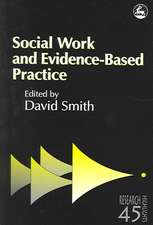Social Work Research Methods: Four Alternative Paradigms
Autor Teresa Morrisen Limba Engleză Paperback – 8 mar 2006
- integrates research methods into a practice model;
- step-by-step guidance is given on how to carry out quantitative and qualitative research with illustrative examples from research projects that have used each of the paradigms;
- offers choices in research method;
- provides a conceptual frameworks to make decisions about which research methods to use in which situation;
- provides the tools to carry out research
as well as the theoretical rationales for each approach;
- discusses the ethics and politics of research and the researcher's responsibility to diversity;
- discusses the use of technology at each stage of a research project.
| Toate formatele și edițiile | Preț | Express |
|---|---|---|
| Paperback (1) | 723.03 lei 6-8 săpt. | |
| SAGE Publications – 8 mar 2006 | 723.03 lei 6-8 săpt. | |
| Hardback (1) | 999.41 lei 6-8 săpt. | |
| SAGE Publications – 8 mar 2006 | 999.41 lei 6-8 săpt. |
Preț: 723.03 lei
Preț vechi: 881.75 lei
-18% Nou
Puncte Express: 1085
Preț estimativ în valută:
138.36€ • 144.64$ • 116.92£
138.36€ • 144.64$ • 116.92£
Carte tipărită la comandă
Livrare economică 07-21 martie
Preluare comenzi: 021 569.72.76
Specificații
ISBN-13: 9781412916745
ISBN-10: 1412916747
Pagini: 352
Dimensiuni: 152 x 229 x 19 mm
Greutate: 0.47 kg
Ediția:New.
Editura: SAGE Publications
Colecția Sage Publications, Inc
Locul publicării:Thousand Oaks, United States
ISBN-10: 1412916747
Pagini: 352
Dimensiuni: 152 x 229 x 19 mm
Greutate: 0.47 kg
Ediția:New.
Editura: SAGE Publications
Colecția Sage Publications, Inc
Locul publicării:Thousand Oaks, United States
Cuprins
Introduction
Research and Generalist Practice
Brief History of Philosophy of Science
PART I: THE POSITIVIST PARADIGM
Introduction
Chapter 1. Engagement - Entrée to the Research Setting Defined
Chapter 2. Assessment - Development of Understanding the Research Focus
Chapter 3. Planning - Rationales for Carrying out the Research Project
Explanatory Designs
Descriptive Designs
Chapter 4. Implementation - Gathering the Data
Managing and Implementing Data Collection
Chapter 5: Evaluation - Developing an Understanding of the Data and its Meaning
Data Entry
Descriptive Statistics
Inferential Statistics
Chapter Six: Termination and Follow Up - Reporting on Findings and Exiting the Research Setting
Research Setting
Conclusion
PART II: POST POSITIVISM
Introduction
Chapter 7. Assessment and Engagement - Development of Understanding of the Research Focus and Entree to the Research Setting
Chapter 8: Planning, Implementation, Evaluation - Rationale for Gathering Data, Data Gathering and Developing an Understanding of the Data and its Meaning
Planning: Rationale for Gathering Data
Implementation: Data Gathering
Evaluation: Developing an Understanding of the Data and its Meaning
Chapter 9: Termination and Follow Up - Reporting on Findings and Exiting the Research Setting and Communication and Distribution of Findings
Conclusion
PART III: CRITICAL THEORY
Introduction
Chapter 10: Assessment, Engagement, and Planning - Development of Understanding of the Research Focus, Entree to the Research Setting. Rationale for Carrying out the Research
Planning: Rationale for Carrying out the Research
Chapter Eleven: Implementation - Gathering Data
Data Collection for Looking and Developing the Ideological Analysis
Data Collection for Action
Data Collection for Evaluation of Action Plans
Chapter 12: Evaluation - Developing an Understanding of the Data and its Meaning
Emergent Analysis
Ideological Analysis
Action Analysis
Chapter 13: Termination and Follow Up - Reporting on Finding, Exiting the Research Setting, and Communication and Distribution of Research Findings
Reporting to Participants and the Target Entity
Reporting to the Participants, Funding Sources and Academic Settings
Alternate Forms of Presentation
Reflection and Celebration
Conclusion
PART IV: CONSTRUCTIVISM
Introduction
Chapter 14: Engagement, Assessment and Planning - Entrée to the Research Setting, Development of Understanding of the Researcher Focus, Rationales for Gathering Data
Chapter 15: Implementation and Evaluation - Gathering Data and Developing and Understanding of the Data and its Meaning
Implementation: Gathering Data
Stages of Data Collection
Evaluation: Understanding the Meaning of Data
Chapter 16: Termination and Follow Up - Reporting on Findings, Exiting the Research Setting and Communication and Distribution of Findings
Researcher's Journals
The Case Study, or Research Report
Exiting the Research Setting
Conclusion
PART V: CROSS CUTTING THEMES: ETHICS, DIVERSITY AND TECHNOLOGY
Introduction
Chapter 17: The Ethics and Politics of Research
Introduction
Ethics
Politics
Conclusion
Chapter 18: The Researcher's Responsibility to Diversity
Introduction
Engagement (Gaining Entrée to the Research Setting)
Assessment (Developing an Understanding of the Research Focus)
Planning (Rationales and Plans for Carrying out These Research Projects)
Implementation: Gathering the Data
Evaluation (Developing an understanding and Interpretation of the Data)
Termination and Follow Up
Chapter 19: The Function of Technology at Each Step of the Way
Engagement (Gaining Entrée to the Research Setting)
Assessment (Developing an Understanding of the Research Focus)
Planning (Rationales and Plans for Carrying out the Research Project)
Implementation (Gathering the Data)
Evaluation (Developing an Understanding and Interpretation of the Data
Termination and Follow Up
Glossary
Phenomenology - An Approach to Understanding the World that Uses Refection, Evidence (i.e. Awareness of Something) and Description
References and Bibliography
Research and Generalist Practice
Brief History of Philosophy of Science
PART I: THE POSITIVIST PARADIGM
Introduction
Chapter 1. Engagement - Entrée to the Research Setting Defined
Chapter 2. Assessment - Development of Understanding the Research Focus
Chapter 3. Planning - Rationales for Carrying out the Research Project
Explanatory Designs
Descriptive Designs
Chapter 4. Implementation - Gathering the Data
Managing and Implementing Data Collection
Chapter 5: Evaluation - Developing an Understanding of the Data and its Meaning
Data Entry
Descriptive Statistics
Inferential Statistics
Chapter Six: Termination and Follow Up - Reporting on Findings and Exiting the Research Setting
Research Setting
Conclusion
PART II: POST POSITIVISM
Introduction
Chapter 7. Assessment and Engagement - Development of Understanding of the Research Focus and Entree to the Research Setting
Chapter 8: Planning, Implementation, Evaluation - Rationale for Gathering Data, Data Gathering and Developing an Understanding of the Data and its Meaning
Planning: Rationale for Gathering Data
Implementation: Data Gathering
Evaluation: Developing an Understanding of the Data and its Meaning
Chapter 9: Termination and Follow Up - Reporting on Findings and Exiting the Research Setting and Communication and Distribution of Findings
Conclusion
PART III: CRITICAL THEORY
Introduction
Chapter 10: Assessment, Engagement, and Planning - Development of Understanding of the Research Focus, Entree to the Research Setting. Rationale for Carrying out the Research
Planning: Rationale for Carrying out the Research
Chapter Eleven: Implementation - Gathering Data
Data Collection for Looking and Developing the Ideological Analysis
Data Collection for Action
Data Collection for Evaluation of Action Plans
Chapter 12: Evaluation - Developing an Understanding of the Data and its Meaning
Emergent Analysis
Ideological Analysis
Action Analysis
Chapter 13: Termination and Follow Up - Reporting on Finding, Exiting the Research Setting, and Communication and Distribution of Research Findings
Reporting to Participants and the Target Entity
Reporting to the Participants, Funding Sources and Academic Settings
Alternate Forms of Presentation
Reflection and Celebration
Conclusion
PART IV: CONSTRUCTIVISM
Introduction
Chapter 14: Engagement, Assessment and Planning - Entrée to the Research Setting, Development of Understanding of the Researcher Focus, Rationales for Gathering Data
Chapter 15: Implementation and Evaluation - Gathering Data and Developing and Understanding of the Data and its Meaning
Implementation: Gathering Data
Stages of Data Collection
Evaluation: Understanding the Meaning of Data
Chapter 16: Termination and Follow Up - Reporting on Findings, Exiting the Research Setting and Communication and Distribution of Findings
Researcher's Journals
The Case Study, or Research Report
Exiting the Research Setting
Conclusion
PART V: CROSS CUTTING THEMES: ETHICS, DIVERSITY AND TECHNOLOGY
Introduction
Chapter 17: The Ethics and Politics of Research
Introduction
Ethics
Politics
Conclusion
Chapter 18: The Researcher's Responsibility to Diversity
Introduction
Engagement (Gaining Entrée to the Research Setting)
Assessment (Developing an Understanding of the Research Focus)
Planning (Rationales and Plans for Carrying out These Research Projects)
Implementation: Gathering the Data
Evaluation (Developing an understanding and Interpretation of the Data)
Termination and Follow Up
Chapter 19: The Function of Technology at Each Step of the Way
Engagement (Gaining Entrée to the Research Setting)
Assessment (Developing an Understanding of the Research Focus)
Planning (Rationales and Plans for Carrying out the Research Project)
Implementation (Gathering the Data)
Evaluation (Developing an Understanding and Interpretation of the Data
Termination and Follow Up
Glossary
Phenomenology - An Approach to Understanding the World that Uses Refection, Evidence (i.e. Awareness of Something) and Description
References and Bibliography
Notă biografică
Teresa Morris is the chair of the social work department and director of social work programs at California State University, San Bernardino (CSUSB). She received her M.S.W. from the University of Hawaii and her Doctorate from UC, Berkeley. She is from England via Australia and now lives in California. In England she worked as a secondary school teacher and a youth and community worker. In Australia she was a community worker, and later an academic. In 1989 she went to California to help start a new social work department and now heads that department. Her publications have been in the areas of refugee resettlement, philosophy of science, and alternative paradigm research methods. She teaches research methods.
Descriere
Social Work Research Methods is the first book to expand social work research methods to include alternative models and integrate these methodologies into general social work practice. In addition to traditional positivist research, author Teresa Morris also describes research methods for post positivism, critical theory and constructivism in a straight forward and accessible style.

















